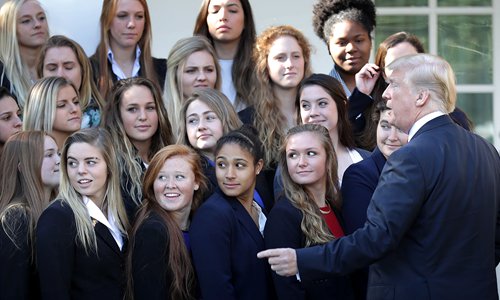HOME >> OPINION
Youth may stir but not rock US politics
By Zhang Wenzong Source:Global Times Published: 2019/7/11 17:24:17

Photo: VCG
US women's national soccer team co-captain Megan Rapinoe's feuding with President Donald Trump in late June has drawn eyeballs. Rapinoe said she would not go to the White House if invited. So, after the US team claimed victory and Trump tweeted his congratulations, quite a few young Americans made a fuss about it.
The episode mirrors young Americans' dissatisfaction with the status quo in the US. To a large extent, this is why the 2018 US midterm elections saw the highest level of participation among youth aged 18-29 in a very long time. More and more young people are entering US Congress. "Thanks to a crop of newly-elected millennials, the average age of Congress in 2019 will drop by 10 years from what it is now," according to US media. In that case, will young people change the US political process and its direction?
American youths are active in thinking and dare to express themselves. But since they have just started their academic research or career, their ability to make a difference is relatively weak. They were greatly affected by the 2008 financial crisis. Due to the heavy burden of student loans, high unemployment rate and shrinking salaries, they bitterly regard the drawbacks of the capitalist system and social inequality.
Many of Trump's policies which have been implemented since he assumed office are at odds with American youth's demands. Young people believe that tax cuts and deregulation are beneficial to big entrepreneurs and the rich; Trump's efforts to kill Obamacare will hurt their welfare; the anti-abortion movement and the crackdown on unauthorized immigration are against liberal values.
In addition, a vast majority of young people are keen on environmental protection. They care about the future of the planet and mankind. US withdrawal from the Paris climate deal and vigorous development of fossil energy thus get on their nerves. To cap it off, Trump's personality does not meet their requirements for politicians.
Young Americans' dissatisfaction with US politics and policies has been reflected in the votes. According to an analysis released by the Center for Information & Research on Civic Learning and Engagement at Tufts University, 31 percent of youth (ages 18-29) turned out to vote in the 2018 midterms, a substantial increase over 2014. The key findings also indicate that 67 percent of youths voted for a Democratic candidate and 32 percent for a Republican candidate, which was "a historic 35-point vote choice gap."
In the US House of Representatives and Senate, an increasing number of young members are bringing American youths' demands to the political spectrum. For instance, with the support of young voters, Alexandria Ocasio-Cortez, an organizer for Senator Bernie Sanders' 2016 campaign, has become the youngest woman elected to Congress. She calls the capitalist system "irredeemable," wants to abolish the Immigration and Customs Enforcement agency and rallies to stop fossil fuel production in 10 years, which go against Trump and the GOP's philosophy. Due to substantial media coverage, Ocasio-Cortez seems to have become a star of the Democratic Party.
Young Americans' increase in voter turnout is a good thing for the Democrats. But it is uncertain whether the trend will continue. During social movements, young people were proactive in the beginning, yet their passion gradually flagged. Polls show that only a minority of young Americans believe they can change the way their society functions by voting. What they have been seeing since they were even younger is political polarization and prejudice in different parties. It is easy for them to lose confidence in US politics.
Yet if they gradually lose their voting enthusiasm and remain distant from politics, their influence on US politics will soon be lost and the problems they are concerned about will be harder to resolve.
Even if young Americans are mobilized today, their political influence should not be exaggerated. To begin with, the proportion of young voters in US elections is not high. Furthermore, generally speaking, youths have limited impact on US presidential elections. For instance, when blue and red states are relatively stable, candidates who can win over the swing states and Rust Belt states will secure the final victory. But there are not many young people in key states like Ohio, Pennsylvania and Florida.
If the Democratic Party wants to turn the tables, they must focus more on ethnic minorities, women, and even a large number of white male voters, rather than young people.
Regardless of how political ecology in the US changes, young people's discontent and demands need to be responded to by policymakers. As a new force in the US left wing, young Americans will continue to influence US politics in their own way.
The author is director of the Institute of American Studies, China Institutes of Contemporary International Relations. opinion@globaltimes.com.cn
Posted in: VIEWPOINT